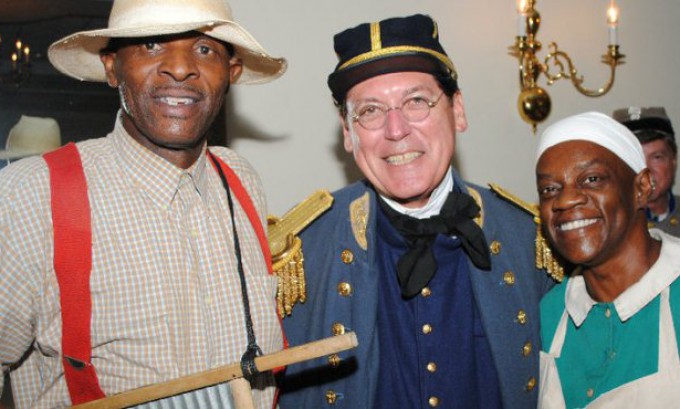The College of Charleston received more than 100 applications from people interested in being the 22nd president of the 13th oldest educational institution in the United States. The applicants included current university presidents, chief academic officers, deans, and leaders from both the public and private sectors.
On Saturday, the college’s Board of Trustees announced that it had voted to offer the job to Glenn McConnell, the current Republican lieutenant governor of South Carolina.
Minutes after an email announcing the choice went out to the campus community, students at the college “viscerally reacted over social media voicing their disapproval,” according to the student-run Cistern Yard News. A few hours later, a few dozen students gathered on campus to protest.
“There’s really nothing we can do to prevent [his presidency],” Adrian Barry, a senior political science major, told Cistern Yard News. “But I like the idea that we are vocal about our discontent.”
Students at the college, along with the NAACP, had expressed opposition to McConnell’s candidacy for weeks prior to the Board of Trustee’s vote. Protests had been held, and signs had been posted around campus reading “Go home Glenn” and “No Confederates for President.” McConnell’s opponents cited, and continue to cite, his lack of experience in higher education and his longstanding and public enthusiasm for the Confederacy.
The Confederacy thing is no secret. McConnell is a longtime Civil War re-enactor. On the biography page he has up on his personal website, under “community involvement/clubs,” McConnell lists the Sons of Confederate Veterans — a national organization “devoted exclusively to commemorating and honoring Confederate soldiers.” And for years, until it closed in 2009, McConnell and his brother ran a Charleston store that specialized in Confederate memorabilia.
Outside South Carolina, McConnell is perhaps most famous for an incident that occurred in 2010, when the National Federation of Republican Women held a board of directors meeting in Charleston. McConnell, who was then the Republican president pro tempore of the state Senate and considered perhaps the most powerful politician in the state, appeared at “Southern Experience” event dressed in a Confederate uniform, and posed for a picture with two black people who appeared to be dressed as slaves. The national headlines prompted McConnell to respond.
“If somebody is trying to be politically correct and use a tunnel vision on it and hook in the slavery issue, they’re on a slippery slope toward narrow-mindedness and they should extend the charity of understanding,” he told The Charleston Post and Courier at the time. “Receive it in the spirit that it is presented.”
The College of Charleston traces its founding back to 1770. During the Civil War, many of its students and faculty fought for the Confederacy. For a century following the war, the school remained a small, local institution. Enrollment was still around 500 when the first black students enrolled, in 1967. Three years later, the college became part of the state university system, and over the next several decades, the college’s enrollment swelled and its footprint expanded. It now boasts over 10,000 undergraduate students, along with 1,100 graduate students. Fifteen percent are minorities.
During the presidential search process, McConnell told the search committee he would work to “foster more diversity” on campus, according to The Columbia State newspaper. He also shared supportive comments about him from black lawmakers.
If everything is finalized, McConnell will be getting a significant pay bump from his current job. According to The State, McConnell currently makes $46,545 a year as lieutenant governor — a part time job. The College of Charleston’s outgoing president makes $380,000.
Dr. Lonnie Randolph Jr., president of the South Carolina State Conference of the NAACP, criticized the way McConnell landed a “plush job without having the credentials.” Randolph pointed out that the college’s board of trustees are elected by the state’s General Assembly, where McConnell served for decades.
“The process is best described as the good ol’ boy system at [its] best in South Carolina again,” Randolph told TPM in an interview this week. “It’s just unfair to any good-thinking person that the best candidate was chosen for the job.”
Randolph said McConnell’s “image is not reflective of America.”
“If they wanted to be called the College of the Confederacy rather than the College of Charleston, he would be a perfect fit,” Randolph said. “This is not personal, this is not Lonnie Randolph. Look at the number of students, the number of administrators, the number of alumni … these are primarily white folks who have complained about the bad image.”
McConnell could not be reached for comment by TPM this week. On Monday, the chair of the College of Charleston Board of Trustees issued a statement, implicitly addressing some of the criticism.
“With three excellent finalists, it would be surprising if all of our campus and community constituencies could agree on who should be the top choice for the presidency,” Greg Padgett said. “Our job as the Board was to make a choice between outstanding candidates, and I’m confident the Board made a careful and thoughtful choice. Lt. Gov. McConnell has told me that he intends to begin meeting with campus and community groups immediately so that he can share his vision and goals, learn more about the College’s programs, and discuss all of the opportunities we have to advance the College’s mission as a first-class institution of higher education. […] I also am certain he will endeavor to earn the full trust of every member of our campus community, including his critics.”
Photo: Glenn McConnell, center, dressed in a Confederate uniform in 2010. Via Fitsnews.






